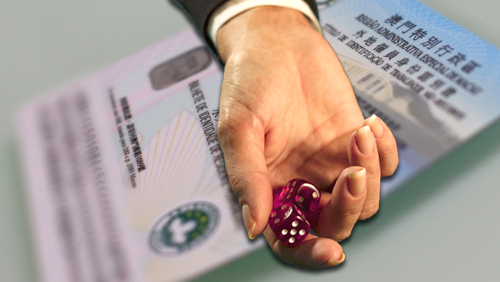An illegal immigration case led authorities in Macau to stumble upon a hotel’s scheme for its frequent Chinese gamblers, local media reported.
 Local police arrested a Chinese man at the Outer Ferry Terminal last week, according to the Macau Business Daily. The man, surnamed Chen, had a blue card on him that identified him as a cleaning worker at a hotel in the city state. A blue card is a work permit issued to a non-resident who wants to work in Macau.
Local police arrested a Chinese man at the Outer Ferry Terminal last week, according to the Macau Business Daily. The man, surnamed Chen, had a blue card on him that identified him as a cleaning worker at a hotel in the city state. A blue card is a work permit issued to a non-resident who wants to work in Macau.
The man, however, told investigators that he was not a worker in the hotel, but he bought the work permit in 2014 from the hotel “to more easily facilitate his visits to the city for gambling.” Chen said he paid HK$50,000 (US$6,225) for the blue card, which he got through a friend in 2014.
Judicial Police refused to identify the hotel—but hinted that it was located “in the central area of the Peninsula”—because they are “still chasing” its agents and staff. Authorities believed the hotel “applied for blue cards for frequent Chinese gamblers to make money.”
China has waged a long-standing war on all things vice, including gambling and prostitution, forcing some local establishments to look for ways to keep their patrons—many of whom have started looking outside of Macau for new gaming locations—in the city state.
US court: No unemployment pay for surly casino worker
Still on the subject of casino workers, a table games dealer at the Sands Casino Resort in Bethlehem is saying goodbye to his jobless aid thanks to his argumentative behavior.
Pennlive.com reported that a Commonwealth Court panel denied Junsai Xu his request for an unemployment compensation because there was enough evidence to prove that his “documented surliness morphed into willful misconduct that renders him ineligible for jobless aid.
Senior Judge Bonnie Brigance Leadbetter said Xu, who argued with customers, his bosses and even with the state referee who heard his plea, was called out repeatedly for his behavior in the four years that he worked at the Sands casino.
The casino’s employee handbook specifically prohibits its workers from arguing or being rude to guests or co-workers. Despite this, Xu received several warnings for his surliness: first in December 2013 after he failed to follow a boss’s orders, then in February 2014 for being rude to customers and arguing with his supervisors, and then in August 2014 for arguing and swearing at guests.
The last straw came in October 2014, when Xu argued with three supervisors on the floor over the proper placement of his hands on the gaming table. Xu told the court that he should have been questioned about his hand placement, but his argument was rejected.
“Because he was fired for his inappropriate reaction to being corrected, it is irrelevant whether he believes he should have been corrected in the first place,” Leadbetter said, according to the report.